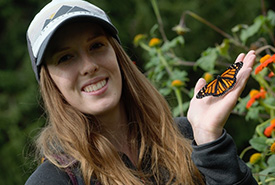Weston Family Conservation Science Fellowship Program
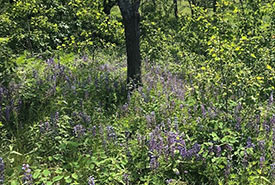
Sundial lupine in the oak savannah (Photo by NCC)
It’s a sunny June day with only a slight whisper of wind in the trees. I am walking slowly through an oak savannah with Angela Demarse, a master's of science candidate at the University of Guelph in Ryan Norris’s lab. We are in search of one of the rarest butterflies in Canada. As we meander through the rolling hills, passing patches of sundial lupine and New Jersey tea, a small brown butterfly suddenly flies by.
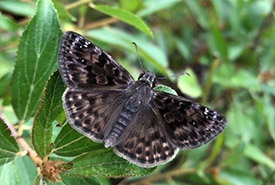
A mottled duskywing sits on a prairie redroot plant (Photo by NCC)
The butterfly comes to a rest on plant, basking in the sun’s rays. As we take a closer look through our binoculars, we can see its complex mottled wing pattern and purple sheen. A mottled duskywing. We also can see three dabs of paint on its wings.
I am helping Angela with her research on the endangered mottled duskywing butterfly. This species, once found throughout southern Manitoba, Ontario and Quebec, is now reduced to only a few isolated populations in Ontario and Manitoba. The results of Angela’s research will inform ongoing conservation efforts by the Nature Conservancy of Canada (NCC) and other organizations, including future reintroductions of mottled duskywings to formerly occupied sites.
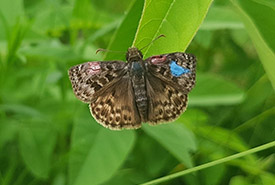
A marked mottled duskywing sits on New Jersey tea plant (Photo by Angela Demarse)
Angela has been gently painting a unique pattern of three dots on the wings of each butterfly that she has carefully caught. This non-invasive marking method allows us to uniquely identify each butterfly we see again. With this information, we can estimate the population size, survival, dispersal and effects of different management practices on two subpopulations of mottled duskywing in southern Ontario.
The butterfly, warmed by the sun, flies over a nearby hill and out of sight. We make a note of the individual we just observed and take a GPS point. Then we resume our walk, in search of the next mottled duskywing enjoying this beautiful day.
Angela will finish collecting the data for her master’s thesis this upcoming summer, but the project will continue with a graduate student recruited through the Weston Family Conservation Science Fellowship Program.
About the fellowship program
NCC is recruiting the first Weston Family Conservation Science Fellows. Two fellowships are being offered to either MSc or PhD students who will start their degrees in September 2020.
This program aims to support and train graduate students conducting NCC priority research so that they can become next-generation leaders in applied conservation science. Research by fellows will support the conservation and management of important natural areas and biological diversity across Canada.
One fellowship project will continue the research on mottled duskywing population size, adult lifespan, dispersal, survival and response to land management activities in Ontario. The student will use these data to develop a predictive population model for this species that will help future recovery decisions, including re-introductions. This student will be based at the University of Guelph, Ontario.
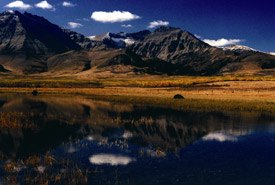
Waterton Park Front, AB (Photo by Kevin Connolly)
The objective of the other fellowship project is to establish a long-term study on the ecology of grassland songbirds in Alberta’s Waterton Park Front Area. The student will examine how different grazing regimes or other management activities influence breeding productivity and survival. They will also examine how conditions during other periods of the year affect songbird health. They will be based at the University of Manitoba.
If you are interested in applying for one of the fellowships, please read more about the program. We are accepting applications until February 3, 2020. Otherwise, stay tuned to follow the progression of these two exciting research projects!

